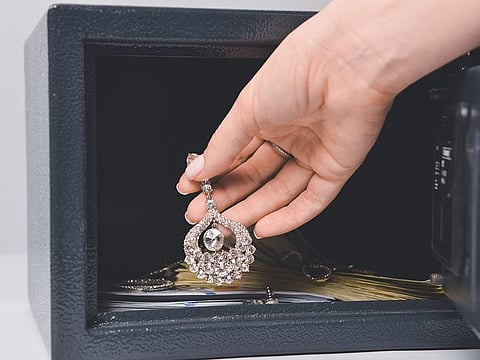Robbing family jewels is not lucrative
The lady of the house kept her gold jewellery where it could be easily snitched

Our cook forgot to put salt in the food the other day and said she was under ‘tension’ as there was a robbery in the other house where she works mornings, and police were questioning everyone.
“The police want me to sign a witness report, but I did not see anything,” she said and immediately my wife became her advocate, pro bono.
“Do not sign anything,” said my wife emphatically. “Ask your daughter (the educated one in the family) to translate the report for me over the phone,” she said, getting ready to defend our cook in the highest court in the land.
Apparently, the lady of the other house kept her gold jewellery where it could be easily snitched, and one day realised it was missing. She called the police and the women police officers came and started questioning the other maid who cleaned the rooms upstairs, on the first floor.
Also Read: It is never too late to change
Also Read: Will you change your name for luck?
Also Read: How to attract money into your wallet
Also Read: Robbing family jewels is not lucrative
“I was in the kitchen cooking and I never saw anything,” said Basamma, our cook, with a tremble in her voice.
“Poor thing,” said my wife, at the condition of our cook while I wondered whether I should sprinkle some salt on the food, because it is one thing doctors advise against doing to safeguard people against hypertension, or high blood pressure.
“Never salt food at the table,” say the doctors because Indians suffer a lot from what is known commonly as the “BP”, like in, ‘How’s your BP today?’. “Fine, thank you, it was 140/80 in the morning. I am eating bitter gourd now, it was suggested by my mother-in-law.”
Twist in the tale
I then inadvertently added more tension to the situation by telling our cook that if she signs the paper, the gang behind the heist will then look for her for revenge.
As my wife was checking the cook’s blood pressure on the portable, digital machine which is a best seller in the local pharmacies, the lady of the other house then put out a message on the WhatsApp group that she went to the police station to check if the jewellery was found, and said she saw the police beating up the maid.
Immediately, my wife turned into her activist avatar mode, and hissed, “How can the police beat up a citizen? It is unconstitutional.”
I said it was a tried and tested method and a cheaper way of doing things. “Questioning a suspect takes a lot of time and there is not enough manpower to bring a crook to justice. Even the justices do not have enough time because of the backlog of cases.”
The maid then decided that getting beaten up was not in her job description and asked the police to give her two weeks to get the jewellery back. Apparently, it was the husband who was the ‘mastermind’ behind the enterprise and the jewellery was now in the hands of someone, who worked from a tiny shop somewhere on Commercial Street.
The easiest thing to rob from Indian homes is gold jewellery as families hoard tons of it, for their daughter’s wedding.
Some Indians don’t put the stuff in bank lockers and stash it away in a steel wardrobe or almirah, that has a handle that squeaks when you open the door to warn the lady of the house.
It is because of this injudicious attitude towards their family jewels that some Indians get robbed around the globe, where ever they settle down.
I once covered a robbery in overseas, and the family that had gone to Mumbai for their holidays and came back to find the front door of their flat unscrewed and leaning on the side.
“Everything is gone,” said the Indian expat morosely, “We had been saving for years, a piece here and a piece there, for her,” he said, pointing to the teenage daughter, who hated being the reason for the robbery.
The police in that country found the robbers ‘within 48 hours’ (a record of some sort) and the robbers stood for a photo shoot with the loot and with the smirking police officers who had nabbed them.
Mahmood Saberi is a storyteller and blogger based in Bengaluru, India. Twitter: @mahmood_saberi
Sign up for the Daily Briefing
Get the latest news and updates straight to your inbox








